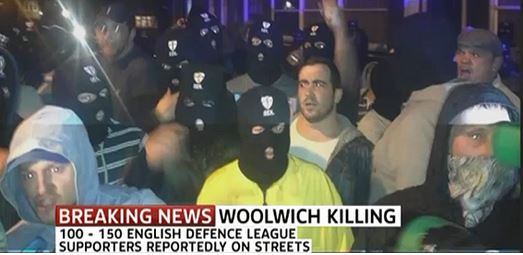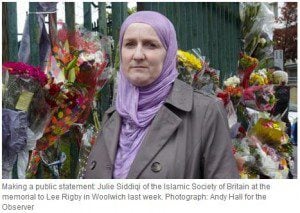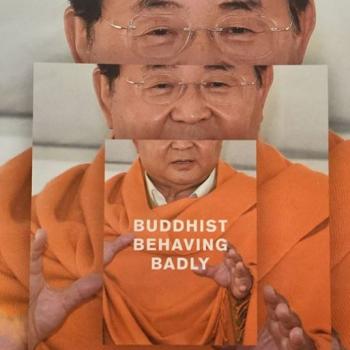Last week’s attack in Woolwich, London surprised and horrified me as much as anyone. It was quickly claimed that the men had shouted Allahu Akbar, “God is great” at the time. One early video showed one of the men also apologizing that women had to see what had happened and that the problem was atrocities in their own land (note, one of the two was born in London, the other in Nigeria), saying, “remove your government. They don’t care about you.”
Commentators rushed to fill in the gaps with terms like “Islamist,” “Baghdad style violence” and “terrorism.”
A steady tide of belligerent racism and Islamophobia ensued.
First a mosque was attacked. Then another. Then another. Then another. The count now is 10. Six days and ten Mosques… At least one Muslim has been murdered in what police suspect is a racially-motivated attack.
And Sunday morning I awoke to news that England’s resident racist political movement, the EDL, had rioted a few miles from where I live (note, there is a case to be made that they are not racist, just xenophobic in case that might seem better). Elsewhere in the UK EDL members were arrested for ‘racist tweets’ ahead of their own marches. And for a bit of background, you can see this 2010 Guardian investigation.
After the attack, the EDL looked a bit like this:

Which just begs the question: why the matching ski masks? (warning, offensive language):
http://www.youtube.com/watch?v=Elw9HZfqt2g

Now, I don’t mean to get too far away from the topic of Buddhism, Islam, and fundamentalism, but it’s worth noting that my own worry on the streets of Great Britain tonight is for what people in the EDL and similar groups might do next.

The fact is, Muslims across the country reacted to the crime with the same shock and horror that I did, quickly condemning the act and discussing their own efforts to deal with violence in their communities (this is one article that you must read).
So what part could Islam have possibly played in the attack?
The answer is by no means simple. As with any religion, there are numerous passages in the Muslim holy book, the Qur’an/Koran, that might be used to justify violence in certain situations. However, there are also other equally, and often more, compelling passages that demand restraint, kindness, and pacifism. The Huffington Post recently hosted a live discussion with two Muslims and one ex-Muslim to help draw out the finer points of this matter and while they tend to meander a bit in terms of their specific topic and rely on various sorts of evidence to support their claims, I highly recommend it as an introduction to various ways Islam can be interpreted and lived today.
For my part, I would suggest that the part Islam played here was incredibly superficial and that the motivations of these men had far more to do with their own 1) sympathies for the suffering of Muslims in countries such as Iraq and Afghanistan, 2) feelings of inability to help those people, and 3) anger toward those involved in the killings. That is, of course, too simple and the details will yet emerge as to just how things came to be this way. One Englishman, who recently watched his own step-brother drawn into a radical group wrote:
They came from all sorts of backgrounds. Some from Christian households, some from immigrant families, some with mainstream Muslim parents. Others, like my stepbrother, were white and came from ordinary middle England towns. There was no single demographic.
Some explained that they had been inspired to convert by things that had happened in their lives. One man whose sister had died of a cocaine overdose blamed Western society for “allowing her to die”. There was another who had watched George W Bush, after the 9/11 attacks, saying that “you are either with us or against us”, and had decided that he didn’t like him and was therefore against him.
All had taken their search to extremes because they were extremists. It was part of who they were – or had grown up to become. I wouldn’t say they were born that way, but at some stage in their short lives they had come to believe that they couldn’t live in the world they had been brought up in, and had turned against it.
The fact that the men in Woolwich attacked a military service member suggests the defensive nature of the attack (as odd as that might sound… If they just wanted to kill non-Muslims or random English people they could have killed several who gathered at the scene after the initial attack. But they didn’t. They only killed the soldier and then attempted to kill armed police when they arrived.) They were going after those who they felt -either rightly or wrongly- were responsible for, or acting as armed representatives of those attacking fellow Muslims elsewhere. They attacked a soldier and armed police, not ordinary Britons, which suggests that this definitely wasn’t an act of terrorism (note the part of the albeit nebulous definition that slips in: “and deliberately target or disregard the safety of non-combatants (civilians)”).
I also have trouble with the term “Islamist.” I suppose it is generally just a shortening of “Islamic fundamentalism,” but when this convenient shortening happens to only one religion, it seems a bit unfair. For instance, do we talk about the Westboro Baptists as a Christianist hate group? No. They’re called “extreme” or “controversial.” And I don’t suppose we’ll be hearing about the horrible “Buddhismist” preacher Saydaw Wirathu of Burma (James Ure is quite right in describing his teachings as Hatred and Anti-Muslim).
Which brings us to the rather horrible suggestion that I have seen in places too numerous to mention: that there is something intrinsic to Islam that is at the root of Islamic fundamentalism. To back up just a moment, you see – if we call it “Islamism” it is so easy to conflate it with “Islam.” There is no need to talk about the broad spectrum of the religion, from the most liberal and/or secular to the most fundamentalist. For instance, it would be irresponsible to say that “Cardinal Dolan incites Christianist Hatred toward Homosexuals,” somehow equating the rather conservative (and I would suggest abhorrent) views of this one particular Catholic leader with Christianity as a whole. If you have a hard time seeing the extremism of the Westboro Baptists or “traditional marriage” Catholics, then think of Christian groups like the LRA, Jonestown, or the KKK.
These last three are not “Christianist” organizations. They are extremist, fundamentalist, far-right-wing, etc. At least that is how we think of them. Because we all know that most Christians are nothing like that.
But whenever a Muslim commits a crime, it seems that the media (and, I’m afraid, many of the people I know) still need to have a conversation about “the problem of Islam.” Warren Jeffs. Is he part of “the problem of Christianity“? No. And given the current love affair that the West has with Buddhism, do you think we’ll ever see a headline: “the problem of Buddhism”?
Of course this is because Buddhism is not a problem. Nor is Christianity. Nor is Islam or any other religion.
The problem is fundamentalism – often fueled by poverty, things like PTSD from being raised in constant fear of violence, warfare, the threat of indiscriminate bombings, shootings, unfair trials, disappearances, torture and so on.
If you spend enough time surrounded by these things, I really don’t think it matters what ideology or religion you identify with: you are quite likely a broken person who needs help. But in societies where help is not given by the state, it is far too often the radicals that step in, offering help with a hefty – but unmentioned – price tag.
This is why Buddhists in some countries will snap into their own versions of Islamophobia, as James Ure’s post – see above- discusses, or racism. Some Western Buddhists or others might use these cases as a reason to look down on Asian Buddhists in general or specific groups in particular, but this would be to completely miss the point of the causes and conditions that brought these individuals to their current state. I am tempted to say that there are common socio-economic-historical strands to be found between the radical/fundamentalist elements of such groups as the EDL, fundamentalist Muslims in England and elsewhere, some Buddhists in Sri Lanka and Burma (and Thailand, while we’re at it), Muslims in various countries (I don’t know enough to try to pin down specifics), and Christians in other various countries (again, leaving it to you to fill in where is most appropriate). We could also throw in the early developers of suicide bombings: Hindus in Sri Lanka.
I fear I have meandered a bit myself.
The point I hope to impart you with is that 1) Buddhism is not intrinsically peaceful, despite what many superficial analysts suggest, 2) Islam is not intrinsically violent, despite what far too many journalists, particularly bought and paid for by the right wing, will tell you, and that 3) fundamentalism is more of a socio-economic or political issue than it is one of religion. Part of what makes religions survive is their ability to speak to many people with their broad variety of statements and justifications. All religions, in their foundation or early development, have justifications for violence in some form or another and no religion that I can think of has survived for more than a century without some of its members being both a victim of violence and a perpetrator, suggesting that none of what happened last week or what has happened since is anything all that new.
Hopefully we can all come to see that religions are not all bad, nor all good. I tend to think that they must do some good (even if it is just a big placebo effect) for their adherents, or else they wouldn’t survive. And many secularists are no doubt trying to figure out how to replicate the best/most useful aspects of religions without all of the superstitious stuff. But until that sets in, if it ever does, we really have to learn to live with one another without the simplistic and often stupid labels and attacks against one another.
* UPDATE: the term ‘fundamentalism’ employed here draws from the massive scholarly collaboration, the “Fundamentalism Project.” You can read excerpts from Donald Swearer’s contribution on Fundamentalistic Movements in Theravadin Buddhism here – the article begins with a short discussion of defining fundamentalism (with thanks to Naga Dhoopati for the heads-up via G+).
Also, have a look at this excellent post, Woolwich and its aftermath, by Peter Goble at the UK Secular Buddhist Community.











